The Importance of Prophets – Part 11
In Part One of this series, we examined the basic importance of prophets, as well as who and what are the ‘major’ and ‘minor’ prophets of the Word. Additionally, in Parts One and Two, we studied the three ‘major’ prophets: Isaiah, Jeremiah, and Ezekiel. Then, we turned our focus to the ‘minor’ prophets in Parts Three, Four, Five, Six, Seven, Eight, and Nine.
In today’s study, we will continue our look into the lives of the ‘Old Testament Prophets…’
Prophets of the Old Testament:
As we discovered in Part One of this series, there are—according to some sources—two classifications of Old Testament prophets—‘major’ and ‘minor’—whom we have examined thus far.
Yet, while the majority of Old Testament prophets—who feature in more than one or two chapters of the Word—fall into these two categories, there are some, such as Elijah and Elisha (who we examined in Part Ten), Samuel, Nathan, and occasionally, Daniel, who are not categorized as either ‘major’ or ‘minor’ prophets, despite their biblical and prophetic importance. These prophets we will simply categorize as ‘Old Testament Prophets.’
Samuel:
The prophet Samuel—despite not being discussed in modern times as often as prophets such as Elijah or Elisha—performed some of the more important prophetic acts than of any other prophet. Yet, even long before Samuel was born, his importance was great.
Samuel is first believed to have been mentioned in Psalm 99 alongside Moses and Aaron, however, what is most interesting here is that some biblical scholars conclude that this is not only referencing the prophet Samuel, but that it was also written well before the birth of Samuel. Although, even if it was not written before Samuel’s birth (or even if it were not referencing Samuel at all), Samuel’s importance still began before his birth…
Samuel’s mother, Hannah—one of the two wives of Elkanah—was barren for many years, and it is her barrenness that first brings into play the importance that Samuel’s life would have.
Hannah prayed before the Lord in the Tabernacle of the Lord, begging God to give her a son, promising Him that she would lend the boy to Him… for ALL the days of his life!
And the Lord, in the process of time, granted her petition. Hannah conceived and bore a son whom she named Samuel, whose name means, asked of God, OR heard by God, OR even, God has heard. For Hannah prayed and God answered her prayer. Further still, Samuel would become God’s and therefore, have a relationship with Him… as God would speak to Samuel, and Samuel, in turn, would be heard by God!
Yet, Hannah went a step further than simply praying. She prophesied over her son, Samuel, and even of the future of Israel—knowingly or unknowingly. Through her words she spoke into Samuel’s life, speaking over him that he would serve the Lord ALL his days, being ‘lent’ to God.
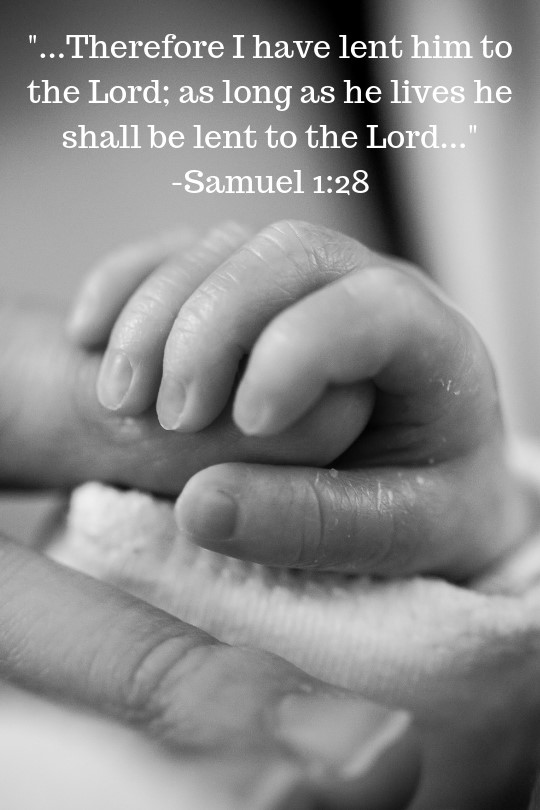
So, Hannah, no matter how much she may have desired to keep Samuel by her side, gave him to the service of the Lord after he was weaned. Thus, Samuel went to live with Eli, the priest of the Tabernacle—whose service to the Lord was growing weak—and there, Samuel served God and was raised up in the ways of the priesthood. Unlike Eli, Eli’s sons, or even many other men of God, Samuel’s eyes were fixed on the Lord, and so, the Lord gave him great favor…
Even when Samuel was but a child he heard the Lord call out to him, “Samuel,” teaching him at a young age to listen for His voice, as those around him no longer would.
“…while Samuel was lying down… the Lord called Samuel. And he answered, ‘Here I am!’ So he ran to Eli and said, ‘Here I am, for you called me.’
“And he said, ‘I did not call; lie down again.’ And he went and lay down.
“Then the Lord called yet again, ‘Samuel!’
“So Samuel arose and went to Eli, and said, ‘Here I am, for you called me.’ He answered, ‘I did not call, my son; lie down again.’ (Now Samuel did not yet know the Lord, nor was the word of the Lord yet revealed to him.)
“And the Lord called Samuel again… So he arose and went to Eli, and said, ‘Here I am, for you did call me.’
“Then Eli perceived that the Lord had called the boy. Therefore Eli said to Samuel, ‘Go, lie down; and it shall be, if He calls you, that you must say, “Speak, Lord, for Your servant hears.”’ So Samuel went and lay down…
“Now the Lord came and stood and called as at other times, ‘Samuel! Samuel!’
“And Samuel answered, ‘Speak, for Your servant hears.’”—1 Samuel 3:3-10

And Samuel grew in body and spirit, and as 1 Samuel 3:19 says, “…and the Lord was with him and let none of his words fall to the ground.”
In the process of time, Eli and his sons died as the Lord had foretold Samuel, and Samuel became the prophetic voice of the Lord for God’s people as the word of the Lord was rare in those days. Furthermore, God endowed Samuel with the power and authority to anoint what would be the first two earthly kings of His people, Israel. Samuel acted as a judge of God’s people all the days of his life, traveling yearly to Bethel, Gilgal, and Mizpah to judge all of Israel in those places…
God used Samuel as a prophetic voice to His people, bringing holy judgement upon them as he spoke the will and plans of the Lord… not only of the ill if they rejected God, but also of the blessings they would receive if they returned to God. Samuel spoke to them of these things, for they cried out to God during times of trouble…
“If you return to the Lord with all your hearts… put away the foreign gods and the Ashtoreths… and prepare your hearts for the Lord, and serve Him only… He will deliver you from the hand of the Philistines.”—1 Samuel 7:3
So they returned to God, though, as often was the case, not for long before they once again allowed mixture into their lives. Mixture… planting seeds of dissatisfaction and restlessness…
It was upon the death of Samson—one the last of the judges of ancient Israel—the people grew even more restless than they had been. Even Samuel, continuing to act as judge, did not appease them. Further still, as Samuel grew older and allowed his sons to judge Israel in his place, the people finally were beyond reasoning…
Pestering Samuel for an earthly king to judge them, as they had witnessed within the neighboring kingdoms (and those God had given them the strength to conquer)—kingdoms that did not follow after God—they believed such a man would make their lives better. Indeed, they became shortsighted and thus, while Samuel’s sons did not follow after God as Samuel had, the request for a king was long in coming… and no amount of holiness within their judges would change it.
“But the thing displeased Samuel when they said, ‘Give us a king to judge us.’ So Samuel prayed to the Lord. And the Lord said to Samuel, ‘Heed the voice of the people in all that they say to you; for they have not rejected you, but they have rejected Me, that I should not reign over them. According to all the works which they have done since the day that I brought them up out of Egypt, even to this day—with which they have forsaken Me and served other gods—so they are doing to you also. Now therefore, heed their voice. However, you shall solemnly forewarn them, and show them the behavior of the king who will reign over them.’”—1 Samuel 8:6-9
So, God sent Samuel to anoint the man the Israelites had chosen—though they were warned of the consequences their choice would bring—and Saul became the first king of the Israelites, for the people had forgotten that God alone was their King…
“And when you saw that Nahash king of the Ammonites came against you, you said to me, ‘No, but a king shall reign over us,’ when the Lord your God was your king.”—1 Samuel 12:12 (emphasis added)

Therefore, as was forespoken, for a time Saul listened to the Lord and was humbled. Yet, he soon lost focus, becoming—as the Lord had warned through Samuel—full of his own power and might, displeasing God in all he did with a hardened heart.
Saul’s first act—of many—that brought displeasure to God was his disobedience regarding His laws of holiness…
“So Saul said, ‘Bring a burnt offering and peace offerings here to me.’ And he offered the burnt offering. Now it happened, as soon as he had finished presenting the burnt offering, that Samuel came…
“And Samuel said, ‘What have you done?’
“…‘When I saw that the people were scattered from me, and that you did not come… and that the Philistines gathered together… then I said, “The Philistines will now come down on me… and I have not made supplication to the Lord.” Therefore I felt compelled, and offered a burnt offering.’
“And Samuel said… ‘You have done foolishly. You have not kept the commandment of the Lord… For… the Lord would have established your kingdom over Israel forever. But now your kingdom shall not continue. The Lord has sought for Himself a man after His own heart…’”—1 Samuel 13:9-14
This first act firmly placed David, a man after God’s own heart, as next in line for the throne, and created a ripple of behavior from Saul that was displeasing in the sight of the Lord…
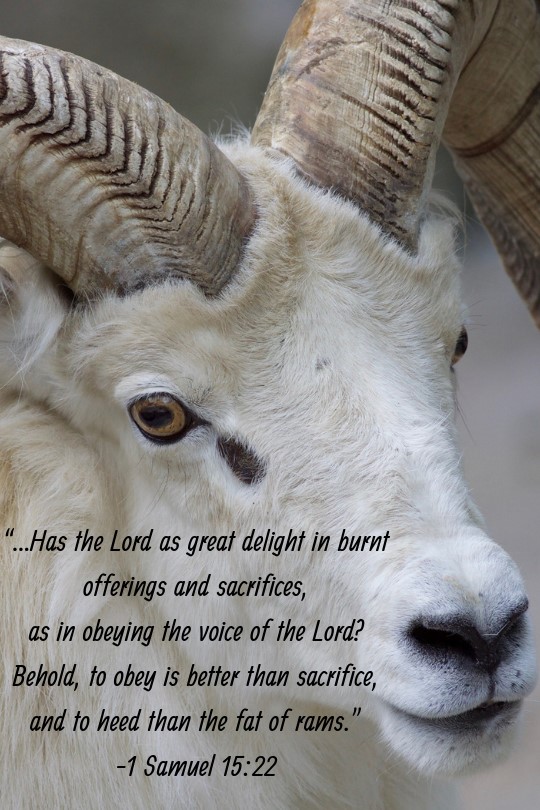
Saul, rash, unwilling to yield to God, and increasingly unstable had the hand of the Lord leave him. Then Samuel was sent by God to anoint David for the kingship, years before David would take the throne and before he faced Goliath… when David was simply considered the least important of his brothers. A young, ruddy shepherd.
“‘…Fill your horn with oil, and go; I am sending you to Jesse the Bethlehemite. For I have provided Myself a king among his sons.’
“So Samuel did what the Lord said, and went to Bethlehem…
“And he said, ‘…I have come to sacrifice to the Lord. Sanctify yourselves, and come with me to the sacrifice…’
“…when they came… he looked at Eliab and said, ‘Surely the Lord’s anointed is before Him!’
“But the Lord said… ‘Do not look at his appearance or at his physical stature, because I have refused him. For the Lord does not see as man sees; for man looks at the outward appearance, but the Lord looks at the heart.’
“So Jesse called Abinadab, and made him pass before Samuel… Then Jesse made Shammah pass by… Thus Jesse made seven of his sons pass before Samuel. And Samuel said to Jesse, ‘The Lord has not chosen these… Are all the young men here?’ Then he said, ‘There remains yet the youngest… keeping the sheep.’
“…‘…bring him…’ So he sent and brought him in. Now he was ruddy, with bright eyes, and good-looking. And the Lord said, ‘Arise, anoint him; for this is the one!’ Then Samuel took the horn of oil and anointed him in the midst of his brothers; and the Spirit of the Lord came upon David from that day forward…”—1 Samuel 16:1, 4-13
And so, after the Lord had spoken against Saul, Samuel left Saul to go to David, and never traveled to Saul again until his death, though it saddened him greatly…

Then Samuel left David, his father and his brothers, and went to Ramah to live. Meanwhile, David’s journey toward kingship would not begin until he became armor bearer to Saul, having brought food to his brothers at the frontlines, and facing a Philistine—the giant named, Goliath.
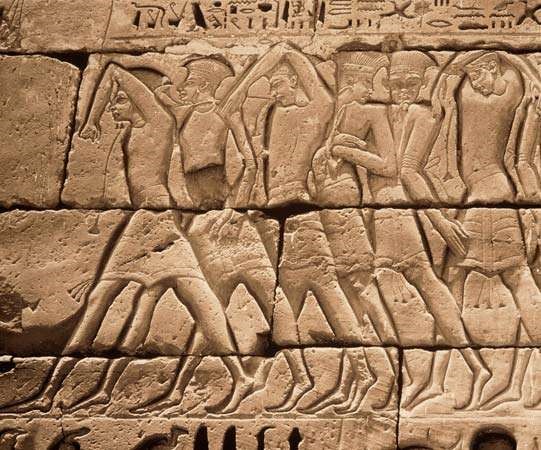
(Source: Werner Forman Archive/Heritage-Images. Relief from Rameses III’s mortuary temple in Luxor, Egypt, depicting a group of believed captive Philistines or ‘sea people,’ who tried to invade Egypt. The Philistines are believed to have arrived to the Middle East around the 12th century BC from Europe; possibly Greece.)
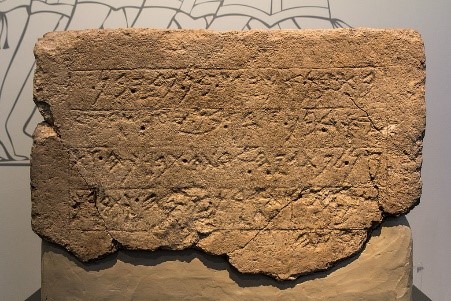
(Source: Israel Museum, Jerusalem, Israel; Photo: Oren Rozen/Creative Commons) Royal dedicatory inscription from the Philistine city of Ekron.)
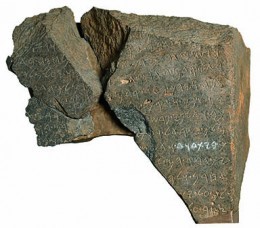
(Source: Israel Museum, Jerusalem, Israel.) Inscribed Armenian stone speaking of the ‘House of David.’ Possibly a record of King Hazael’s victory against the kings of Judah and Israel.)
“And Saul said to David, ‘You are not able to go against this Philistine to fight with him; for you are a youth, and he a man of war from his youth.’
“But David said… ‘Your servant used to keep his father’s sheep, and when a lion or a bear came and took a lamb out of the flock, I went out after it and struck it, and delivered the lamb from its mouth; and when it arose against me, I caught it by its beard, and struck and killed it. Your servant has killed both lion and bear; and this uncircumcised Philistine will be like one of them, seeing he has defied the armies of the living God.’”—1 Samuel 17:33-36
Yet, David would not become king without first growing to become a man in the house of Saul and fleeing from him to Samuel and the wilderness…
“So David fled and escaped, and went to Samuel at Ramah, and told him all that Saul had done to him. And he and Samuel went and stayed in Naioth… Then Saul sent messengers to take David. And when they saw the group of prophets prophesying, and Samuel standing as leader over them, the Spirit of God came upon the messengers of Saul, and they also prophesied. And when Saul was told, he sent other messengers, and they prophesied likewise. Then Saul sent messengers again the third time, and they prophesied also. Then he also went to Ramah, and… said, ‘Where are Samuel and David?’
“…‘Indeed they are at Naioth in Ramah.’ …Then the Spirit of God was upon him also, and he… prophesied until he came to Naioth in Ramah. And… stripped off his clothes and prophesied before Samuel in like manner, and lay down naked all that day and all that night…”—1 Samuel 19:18, 20-24
However, after this we do not see Samuel again until his death. Therefore, Samuel did not live to see the Lord’s chosen placed upon the throne of the tribes of Israel. Yet, he did not doubt God’s words, and in all the days of his life, Samuel—unlike his sons to follow—obeyed the Lord, fulfilling the prophecies of his mother, Hannah, that he would be lent to the Lord ALL his life!
During the course of this series we will continue to examine the lives of prophets of the Word. We will see how those of the Old Testament prophesied not only of what was about to occur—or would occur without action—but, how they laid out prophecies which not only came about during the days of Jesus, but are still coming to pass to this day!
Finally, we will examine New Testament prophets and how, from the book of Matthew to Revelation, what was and is to come, was revealed to us.